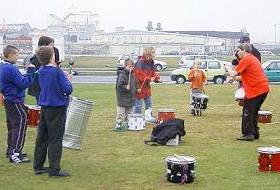|
In her speech opening Green Week 2003, Wallstrom said the world’s resources will be enough to satisfy the needs of everyone even in 50 years time, if humans learn to use them more efficiently, more equally. "We have to cut the link between economic growth and environmental degradation and depletion of natural resources," she said.
"Reaching sustainable patterns of consumption and production will require a change of behaviour," Wallstrom said. "We have to liberate ourselves from well established thinking and behavioural patterns, look differently at how we are consuming and producing, identify key measures. Our aim need not be to consume and produce less, but rather to consume and produce differently and better – to make more from less."
Today, World Environment Day, the Green Week debate focused on water. Discussion centred on the EU Water Initiative and on how to combat the growing problem of floods. Delegates were able to participate in a tasting session of drinking water samples taken from cities across Europe.
Wallstrom presented the annual report on bathing water quality for 2002. The report presented today confirms the results seen in previous years with a high percentage of bathing sites being in compliance with the compulsory standards in the law. The compliance rate for coastal sites is 95.8 percent, and for freshwater sites 91.1 percent.
The encouraging results for 2002 were achieved despite the torrential rainfall and floods, which occurred in central Europe in August and September 2002. One worrying aspect of the 2002 results was the tendency of some EU member states to ban bathing at sites which showed poor compliance or to de-identify such sites rather than addressing the causes of pollution that led to the poor bathing water quality.
Speaking at the press conference to launch the 2002 bathing season report, Wallstrom said, "The impact of water quality on bathers is a clear demonstration of the linkages between environmental quality and human health. The susceptibility of children to gastric infections and respiratory illnesses associated with swimming in polluted waters underlined why we need to maintain our vigilance."
A Green Week 2003 exhibition in the Charlemagne building includes 62 stands, featuring projects realized by environmental organizations and networks, businesses, consumer organizations, educational and research establishments, and national, regional and local authorities.
Cyber stations with Internet access were available for participants throughout the week. A meeting point facilitated contacts between participants and stimulated informal discussions.
An Art Gallery will permanently display the winning entries in the Green Week 2003 painting and sculpture competitions. About 50 works will be on display, featuring the creativity and vision of children aged five to 16 from around the world.
In Trento, Italy, an exhibition, workshops and conferences on environmental education have been in progress since May 26 and will continue through Saturday.
Birmingham, England is marking Environment Week with displays and events each covering a different environmental theme each day organized by the Birmingham City Council. Environmental issues related to food, health, noise pollution, business, technologies, and waste all received attention this week.
|

